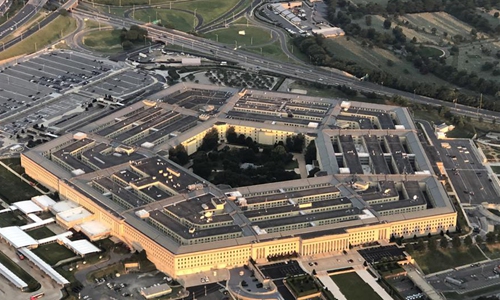
By Guo Yuandan
As the novel coronavirus pneumonia (COVID-19) ravages the globe and US Defense Secretary Mark Esper admitted on Monday that the US military's combat readiness could be affected, Chinese military experts said on Tuesday that the US military could be dealt a huge blow and lose its influence over its allies.
Esper said on Monday that the disease has forced the US military to cancel some training exercises, and the virus could affect its readiness to conduct combat missions if it worsens, USA Today reported on Monday.
This is the first time the Pentagon has admitted that COVID-19 could potentially hit the US military's combat readiness, although Esper insisted that this will not impact its ability to fulfill its missions in the US and abroad.
As of Monday, the Pentagon reported 243 confirmed COVID-19 cases within the US Department of Defense, with 133 cases being active-duty military personnel, CNBC reported.
In comparison with the data from previous days, it is obvious that the US military is seeing a rapid increase in COVID-19 cases, which is in line with the increasing trend of infections in the US overall.
The Pentagon implemented restrictions on travel for US military personnel, domestic and international, starting March 16, and Esper announced further restrictions on personnel entry into the Pentagon on Monday.
These measures will inevitably impact the US' combat readiness, analysts said.
The US military has had to stop regular military deployment adjustments across the globe, cancel or postpone joint exercises with its allies, and scale down or abandon its own training, which will deal a huge blow to the US military's combat readiness, Song Zhongping, a Chinese military expert and TV commentator, told the Global Times on Tuesday.
Since the US military follows a global deployment strategy, the COVID-19 pandemic will have the biggest impact on its combat readiness, Song said, noting that the US has military bases around the world to exercise its international influence, but now the strategy has backfired and many of its troops must stay where they are and cannot interact with its allies as frequently.
In the long term, this will reduce the US military's influence among its allies, Song said, adding that the epidemic has exposed the fact that the US military's capability in situations other than war is actually low, and its allies, particularly NATO members, have not been able to receive support from the US.
The impact of COVID-19 epidemic on the US military is also reflected in the conflict between its global deployment and safety of its personnel, Song said. "The Americans must reconsider and make a choice between global deployment and the safety of its personnel. If the US military insists on global deployment, it must have enough measures to deal with crises like this epidemic," he said.













